Is it important to study history? Why do we need to know what’s come before us? Isn’t it enough to just “live in the moment?” Renowned historian Victor Davis Hanson explores these important questions.
Prager U
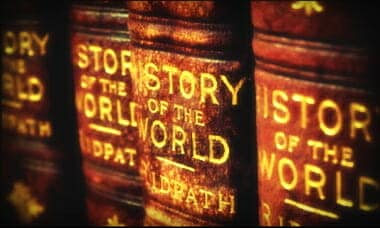
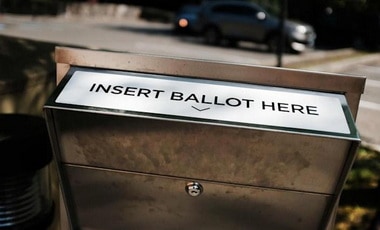
Recent Voter Fraud Happenings (Wisconsin and Pennsylvania)
I combine two of Larry Elder’s hours from Tuesday’s show (1-18-2022). I also add video where I can to match or add to the audio Larry used for the show. This is an excellent update to the voter fraud issues I and others have mentioned since 2019.
Here are some of the resources used as well as additional links to support well-reasoned evidence.
- Wisconsin Judge Rules Ballot Drop Boxes, Ballot Harvesting Violate State Law (TOWNHALL)
- Video Shows Pennsylvania Official Admitting Election Laws Were Broken In 2020 (THE FEDERALIST)

Are Pipelines Safe? (Preger U)
What’s the safest way to transport oil? According to environmentalists, progressive politicians, and the media, it’s anything but pipelines. Are they right? Diana Furchtgott-Roth, adjunct professor at George Washington University, dives into the data for answers.
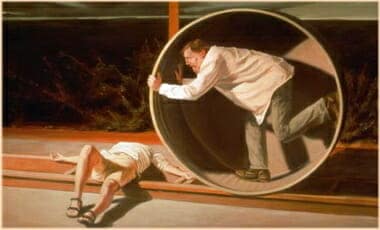
5-Part Series: Science and God | Stephen Meyer
Can you believe in God and science at the same time? Many claim that belief in religion is at odds with “the science” of today. But is that really true? In this five-part series, Stephen Meyer, Senior Fellow at the Discovery Institute, attempts to answer this existential question.
Series “Broken Out”
- Are Religion and Science in Conflict? — Science and God | Does belief in God get in the way of science? The idea that science and religion are inevitably in conflict is a popular way of thinking today. But the history of science tells a different story.
- How Did the Universe Begin? — Science and God | Was the universe always here, or did it have a beginning? If so, how did it start? Mankind has debated these questions for centuries and has only recently begun to find some answers. And those answers may point to some even more intriguing conclusions.
- Aliens, the Multiverse, or God? — Science and God | Even staunch Darwinists have acknowledged that life in the universe displays an appearance of design, rather than being created out of random chance. If that’s true, where did that design come from? In other words, does a design require a designer?
- What Is Intelligent Design? — Science and God | Chances are if you’ve heard anything about intelligent design, you’ve heard that it’s faith-based, not science-based. Is that true? Or does modern science, in fact, point us in the direction of a designing intelligence?
- What’s Wrong with Atheism? — Science and God | Is there any meaning to life? Or is life nothing more than a cosmic accident? Scientific atheists claim the latter, but ironically, it’s science itself that suggests the former.

The Great Texas Freeze of 2021
In February 2021, the temperature in Texas dropped below zero. Not a big deal, right? Texas is the energy state. Just go home, turn on the heat, and hunker down. That’s how it should have gone. But it didn’t. What happened, and why?

Some SOFA/Iraq History (RPT FLASHBACK)
What if people have the war in Iraq backwards? What if George W. Bush and the U.S. military won it, and Barack Obama and the Democrats gave it away? Well, we don’t have to wonder what if, because Pete Hegseth, who served in Iraq, explains what happened.
Iraq and the failed Status of Forces Agreement (SOFA), FLASHBACK (August 2016)
Smack Down Galore!
(Above Video) The caller notes that the narrative is that the Islamic State would have still come to power even if we kept troops in Iraq. Which is true, they would have still come to existence, in Syria. But Iraq would not have lost any cities or territories if we still had a presence in Iraq. The caller mentioned a force of 10,000 troops, it would have been closer to 30,000 troops. And having a base of operations in country would have allowed the administration to deal more effectively with the Islamic State in Syria (flying sorties, and supporting quick reaction [spec-ops] units activity), and the like.
(Above Video) Megyn Kelly Destroys Jen Psaki who can’t get off talking points.
(Above Video) Larry Elder (and Paul Bremer) dismantle older as well as new mantras flying around via our friends on the left. In the interview that is the centerpiece of the segment[s] here via Larry Elder, Erin “Monkey” Burnett gets all of her talking points smacked down. The only thing Miss Burnett accomplished was showing her bias/sarcasm well.
Here Bremer educates Erin with facts she knew, but refuses to deploy in her logic because it would ruin her defense of her Master Obama, “The planning in 2011, leaked very heavily from the Pentagon and the White House was to keep 20 to 30 thousand troops after 2011, the White House leaked that it wanted to only keep 3,000 troops, then they said to al-Maliki not only do we want a Status of Forces Agreement but you have to get it through your Parliament. So for the first time, to my knowledge, since 1945, we have 84 SOFA agreements around the world, we were telling the host government how to they proceed in approving that Status of Forces Agreement. That put al-Maliki in an impossible situation.”
Bombs Over Erbil
Obama is SUCH a joke! HotAir has this:
….A dandy little edit here by the Free Beacon, via Ace. I know I’ve linked it before but the piece you want to read as accompaniment is Iraq hawk turned dove Peter Beinart lamenting all the ways Obama screwed up post-Bush American policy in the country. O wants you to believe at the end of the video here that he pushed hard to keep a residual American force inside Iraq for counterterrorism (i.e. counter-ISIS) operations but it’s simply not true. He didn’t push hard for it; when Maliki initially resisted his demand that U.S. troops be granted immunity from prosecution in Iraqi courts, O took that as his cue to pull everyone out. And that wasn’t the only time he indulged Maliki’s dumbest impulses. The story of the U.S. vis-a-vis Iraq after 2009, writes Beinart, is a story of disinterest and disengagement:
The decline of U.S. leverage in Iraq simply reinforced the attitude Obama had held since 2009: Let Maliki do whatever he wants so long as he keeps Iraq off the front page.
On December 12, 2011, just days before the final U.S. troops departed Iraq, Maliki visited the White House. According to Nasr, he told Obama that Vice President Tariq al-Hashimi, an Iraqiya leader and the highest-ranking Sunni in his government, supported terrorism. Maliki, argues Nasr, was testing Obama, probing to see how the U.S. would react if he began cleansing his government of Sunnis. Obama replied that it was a domestic Iraqi affair. After the meeting, Nasr claims, Maliki told aides, “See! The Americans don’t care.”
In public remarks after the meeting, Obama praised Maliki for leading “Iraq’s most inclusive government yet.” Iraq’s Deputy Prime Minister, Saleh al-Mutlaq, another Sunni, told CNN he was “shocked” by the president’s comments. “There will be a day,” he predicted, “whereby the Americans will realize that they were deceived by al-Maliki … and they will regret that.”
And now the day has come. Remember that the next time O walks out to the podium and acts indignant about Maliki clinging to power.
One more bit, this from Dexter Filkins, on just how much of a fight O put up in demanding a residual troop presence:
President Obama, too, was ambivalent about retaining even a small force in Iraq. For several months, American officials told me, they were unable to answer basic questions in meetings with Iraqis—like how many troops they wanted to leave behind—because the Administration had not decided. “We got no guidance from the White House,” Jeffrey told me. “We didn’t know where the President was. Maliki kept saying, ‘I don’t know what I have to sell.’ ” At one meeting, Maliki said that he was willing to sign an executive agreement granting the soldiers permission to stay, if he didn’t have to persuade the parliament to accept immunity. The Obama Administration quickly rejected the idea. “The American attitude was: Let’s get out of here as quickly as possible,” Sami al-Askari, the Iraqi member of parliament, said…
(Still the Lynn University campus debate via WaPo)
- Romney: “With regards to Iraq, you and I agreed, I believe, that there should be a status of forces agreement,”
- Obama: “That’s not true,”
- Romney: “Oh, you didn’t want a status of forces agreement?”
- Obama: “No,” … “What I would not have done is left 10,000 troops in Iraq that would tie us down. That certainly would not help us in the Middle East.”
Some other things Mitt got right and “O” didn’t:
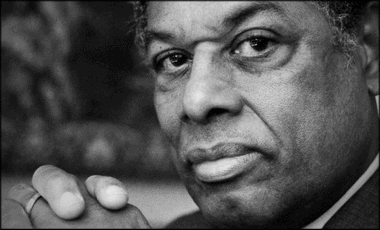
The Great Thomas Sowell (Prager U)
He’s an economist, a historian, a philosopher, and one of the greatest social theorists America has ever produced. His name is Thomas Sowell, and he might be the most important scholar you’ve never heard of. Jason Riley, Senior Fellow at the Manhattan Institute, tells his inspiring story.
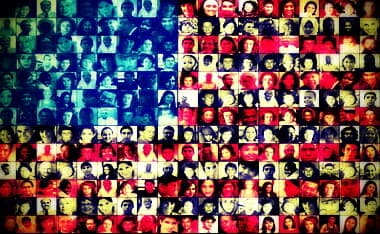
An Olympian Should Be Honored to Represent the USA (Fireside Chat)
Folks, this might be the most important Independence Day to celebrate than ever before. It doesn’t (and never did) mean that you agree with every single thing that America has done. But what this country HAS gotten right is a miraculous achievement, and we are all unfathomably lucky beneficiaries. Have a happy and reflective Fourth!

Is The National Anthem Racist? (Prager U Update)
(Updated 7-3-2021)
I figured this recent “Anthem Protest” would be a good update for the post. This comes to me via RIGHT SCOOP:
Gwen Berry explained today why she reacted with such contempt for the National Anthem over the weekend and it’s absolutely ridiculous (video at Twitter… click pic):
Berry claims that “If you know your history, you know the full song of the National Anthem. The third paragraph speaks to slaves in America, our blood being slang and piltered all over the floor. It’s disrespectful and it does not speak for black Americans. It’s obvious. There’s no question.”
I found this explanation unbelievable. But because I don’t know the verse, I went back and read it anyway:
And where is that band who so vauntingly swore
That the havoc of war and the battle’s confusion,
A home and a country, should leave us no more?
Their blood has washed out their foul footsteps’ pollution.
No refuge could save the hireling and slave
From the terror of flight, or the gloom of the grave:
And the star-spangled banner in triumph doth wave,
O’er the land of the free and the home of the brave.
So it turns out she’s an idiot. Yes, it uses the world ‘slave’, but it doesn’t remotely mean what she claims it means. It’s referring to the British, which is clear from the context. Not American slaves.
Erick Erickson provides us more insight here:
[….]
…the third verse of the National Anthem has nothing to do with slave labor. She’s taking language out of context by using a modern day definition and applying it to a 17th century statement. — Kenny Webster
. . . . . .
(Originally Posted Sep 29, 2017)
✩✩✩ OUR NATIONAL ANTHEM ✩✩✩
(Above video description: The original file AND description can be found here in full — HOWEVER, the audio was horrible. I tried to raise the DBs but couldn’t get rid of the hiss… but it is a must watch!)
UPDATED VIDEO ADDED
The Star-Spangled Banner, long a treasured symbol of national unity, has suddenly become “one of the most racist, pro-slavery songs” in American culture. Why is this happening? And more importantly, is it true? USA Today columnist James Robbins explores the history of the song and its author to answer these questions.
A friend asked a question about a challenge via “The Root” about the National Anthem. This is the “verse” said to be “racist”
No refuge could save the hireling and slave
From the terror of flight or the gloom of the grave,
And the star-spangled banner in triumph doth wave
O’er the land of the free and the home of the brave.
It is said our (yes, OUR) anthem glories in black slaves dying. Here is how it is encapsulated in the NEW YORK TIMES:
The journalist Jon Schwarz, writing in The Intercept, argued yes, denouncing the lyrics, written by Francis Scott Key during the War of 1812, as “a celebration of slavery.” How could black players, Mr. Schwarz asked, be expected to stand for a song whose rarely sung third stanza — which includes the lines “No refuge could save the hireling and slave/From the terror of flight or the gloom of the grave” — “literally celebrates the murder of African-Americans”?
Here is another sport figure’s comments on the flag:
- “And stop trying to sweep it under the rug. But, see, as long as you paint that narrative, oh, it’s the Anthem, I can’t — no — anybody that does something to the Anthem — well, we know what the anthem was originally written for and who it was written by, okay? The flag, okay? We understand what the flag? What does it represent? — SHANNON SHARPE
Here, the SMITHSONIAN helps set the scene for us and how the Anthem came to be:
…A week earlier, Francis Scott Key, a 35-year-old American lawyer, had boarded the flagship of the British fleet on the Chesapeake Bay in hopes of persuading the British to release a friend who had recently been arrested. Key’s tactics were successful, but because he and his companions had gained knowledge of the impending attack on Baltimore, the British did not let them go. They allowed the Americans to return to their own vessel but continued guarding them. Under their scrutiny, Key watched on September 13 as the barrage of Fort McHenry began eight miles away.
“It seemed as though mother earth had opened and was vomiting shot and shell in a sheet of fire and brimstone,” Key wrote later. But when darkness arrived, Key saw only red erupting in the night sky. Given the scale of the attack, he was certain the British would win. The hours passed slowly, but in the clearing smoke of “the dawn’s early light” on September 14, he saw the American flag—not the British Union Jack—flying over the fort, announcing an American victory.
Key put his thoughts on paper while still on board the ship, setting his words to the tune of a popular English song. His brother-in-law, commander of a militia at Fort McHenry, read Key’s work and had it distributed under the name “Defence of Fort M’Henry.” The Baltimore Patriot newspaper soon printed it, and within weeks, Key’s poem, now called “The Star-Spangled Banner,” appeared in print across the country, immortalizing his words—and forever naming the flag it celebrated….
THE DAILY CALLER notes (and so does SNOPES) that this verse was in reference to slaves and mercenaries that fought on the British side:
Francis Scott Key wrote the song the morning after the British bombarded Fort McHenry toward the end of the War of 1812, when he saw the American flag still waving. In these lines of the third verse he’s celebrating the death of slaves and mercenaries who opted to fight for the British in exchange for their freedom following the war.
INDEPENDENT JOURNAL REVIEW puts the idea to bullet points:
- The Star Spangled Banner lyrics “the hireling ” refers to the British use of Mercenaries (German Hessians) in the American War of Independence
- The Star Spangled Banner lyrics “…and slave” is a direct reference to the British practice of Impressment (kidnapping American seamen and forcing them into service on British man-of war ships). This was a Important cause of the War of 1812
- Francis Scott Key then describes the Star Spangled Banner as a symbol of triumph over all adversity
The U.S. CAPITAL HISTORICAL SOCIETY also comments on the added “fifth verse” by Oliver Wendell Holmes at the start of the Civil War:
Fifty years later, in 1861, poet Oliver Wendell Holmes Sr. would write a fifth verse to the National Anthem, reflecting the nation’s strife and looking toward a more peaceable future:
When our land is illum’d with Liberty’s smile,
If a foe from within strike a blow at her glory,
Down, down, with the traitor that dares to defile
The flag of her stars and the page of her story!
By the millions unchain’d who our birthright have gained
We will keep her bright blazon forever unstained!
And the Star-Spangled Banner in triumph shall wave
While the land of the free is the home of the brave.
Here, Wendell, unlike Key, foresaw not only the inevitable emancipation of the nation’s slaves, but also the freed African Americans gaining full citizen rights and ensuring the country’s preservation. Today, this verse is not considered an official part of the National Anthem, but during the Civil War, it was printed in song books throughout the northern United States as an extension of Key’s lyrics. In this way, Francis Scott Key and the War of 1812 bequeathed to the nation not just a song, but a step toward the perpetuating of liberty—just as the Revolutionary War and Civil War did.
Again, the Left views complex history through the lens of a historical Marxist view. Something that Howard Zinn tried to do as well, but did so by rewriting history… as the Modern Left still does.
Francis Scott Key, like many during that time, had a varied history on slavery. He fought for slaves to be free in court – pro bono. But, he also fought to return runaway slaves to owners at some point in his life – probably for money. So he was an opportunistic lawyer to pay bills… nothing has changed. WIKI continues with this:
Key publicly criticized slavery’s cruelties, so much that after his death a newspaper editorial stated “So actively hostile was he to the peculiar institution that he was called ‘The Nigger Lawyer’ …. because he often volunteered to defend the downtrodden sons and daughters of Africa. Mr. Key convinced me that slavery was wrong—radically wrong.” In June 1842, Key attended the funeral of William Costin, a free, mixed race resident who had challenged Washington’s surety bond laws.
The SMITHSONIAN again notes that Key was a founding member and active leader of the American Colonization, of which the primary goal was to send free African-Americans back to Africa. Keys, even though he abhorred slavery, and fought to free slaves at times, was removed from the board in 1833 as its policies shifted toward abolitionist. The mood of the nation as a whole was shifting. While Keys couldn’t envision a multi-ethnic nation, others could. But Keys position wasn’t necessarily “racist,” as some ex-slaves wanted the same. To recall a portion of the above quote from the Capital Historical Society, “…Wendell, unlike Key, foresaw not only the inevitable emancipation of the nation’s slaves, but also the freed African Americans gaining full citizen rights and ensuring the country’s preservation.”
YOU SEE, people change… as do nations (because they, like corporations, are made up of people). I make this point in my post on AUGUSTINE, who is often used to support old-earth positions… but little know that later in his life he rejected the old-earth view and wrote quite a bit on the young earth (creationist) viewpoint.
A man needs to be judged by his life’s journey. As do nations.
Likewise, conservatives believe that Robert Byrd may have sincerely changed his formerly racist beliefs. But when Democrats accuse Republicans of racism because they went to Strom Thurmond’s (one of the only major Dixiecrats to change to Republican – watch here and here) funeral and gave him praise, even though he changed his views on race/racism. All we point out is that if praising an ex Dixiecrat at a funeral makes one racist… then what does lauding a KKK Grand Kleagle at his funeral make Democrats?
A man needs to be judged by his life’s journey.
So does a nation.
Here is the rest of the SMITHSONIAN piece I wish to excerpt:
A religious man, Key believed slavery sinful; he campaigned for suppression of the slave trade. “Where else, except in slavery,” he asked, “was ever such a bed of torture prepared?” Yet the same man, who coined the expression “the land of the free,” was himself an owner of slaves who defended in court slaveholders’ rights to own human property.
Key believed that the best solution was for African-Americans to “return” to Africa—although by then most had been born in the United States. He was a founding member of the American Colonization Society, the organization dedicated to that objective; its efforts led to the creation of an independent Liberia on the west coast of Africa in 1847. Although the society’s efforts were directed at the small percentage of free blacks, Key believed that the great majority of slaves would eventually join the exodus. That assumption, of course, proved to be a delusion. “Ultimately,” says historian Egerton, “the proponents of colonization represent a failure of imagination. They simply cannot envision a multiracial society. The concept of moving people around as a solution was widespread and being applied to Indians as well.”
You see, Americans’ belief then was “not merely in themselves [shocker to millennials] but also in their future…. lying just beyond the western horizon” (ibid). And that is key. As Paul Johnson rightly notes in his history book on America:
“…can a nation rise above the injustices of its origins and, by its moral purpose and performance, atone for them? All nations are born in war, conquest, and crime, usually concealed by the obscurity of a distant past. The United States, from its earliest colonial times, won its title-deeds in the full blaze of recorded history, and the stains on them are there for all to see and censure: the dispossession of a indigenous people, and the securing of self-sufficiency through the sweat and pain of an enslaved race. In the judgmental scales of history, such grievous wrongs must be balanced by the erection of a society dedicated to justice and fairness.”
Paul Johnson, A History of the American People (New York, NY: Harper Perenial, 1997), 3.
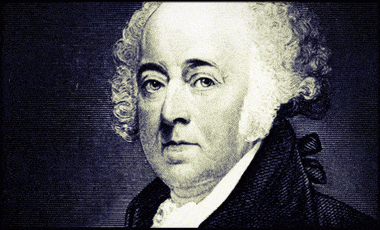
John Adams… Ethical Monotheist, Not a Deist
A short excerpt of Dennis Prager’s interview of Brad Thompson, Professor of Political Science at Clemson University. (PragerU’s video on John Adams is here)
Other posts of mine discuss in some way John Adam’s religious views as well as “Deism”:
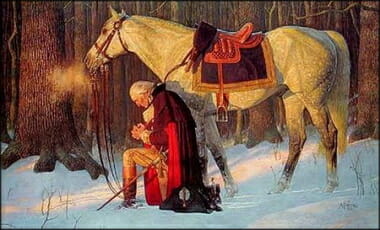
Is the Constitution and It’s Signers… Secular? (Fraudulent Memes)
A Facebook friend posts a lot of stuff from the Left. And while I could spend all day refuting in similar fashion much of it (like the below), this topic caught my eye. Here is the FB graphic she posted on her wall:
So, let’s deal with these in order, shall we?
THOMAS JEFFERSON
This is the headline at THE JEFFERSON MONTICELLO site: “Christianity is the most perverted system that ever shone on man (Spurious Quotation)” — spurious indeed. They follow this with the fuller quote:
This comment on Christianity is a somewhat paraphrased excerpt from the following letter written by Thomas Jefferson to Joseph Priestley:
“this was the real ground of all the attacks on you: those who live by mystery & charlatanerie, fearing you would render them useless by simplifying the Christian philosophy, the most sublime & benevolent, but most perverted system that ever shone on man, endeavored to crush your well earnt, & well deserved fame.” – Jefferson to Priestley, March 21, 18011 (entire letter)
There are other useful links at MONTICELLO’S link to this topic. Even CHECK YOUR FACT has this regarding the Jefferson quote:
Verdict: False
There is no evidence that Jefferson ever said or wrote this. His estate at Monticello includes the saying on its list of “spurious quotations.”
Fact Check:
The quote has been frequently attributed to Jefferson on social media, appearing in numerous memes and posts on Facebook.
However, the Daily Caller found no record of Jefferson ever saying or writing this expression. A search of the Papers of Thomas Jefferson returned no results matching the alleged saying. It doesn’t appear in a collection of his quotes and letters either.
His estate at Monticello also includes the statement on its list of “spurious quotations.” The first known appearance in print dates back to 1996, according to the Thomas Jefferson Foundation…..
BENJAMIN FRANKLIN
The fuller quote reads… and note, many say this about their youth as well. I say similar things — as I stayed out of the church as a youth when I could.
- “I have found Christian dogma unintelligible. Early in life I absented myself from Christian assemblies.”
Later in life however, Franklin (and I would say myself) wrestled with religious matters well, and came out on the theistic end of life. Here, for example, is a letter from Benjamin Franklin to the “atheist” Thomas Paine:
TO THOMAS PAINE.
[Date uncertain.]
DEAR SIR,
I have read your manuscript with some attention. By the argument it contains against a particular Providence, though you allow a general Providence, you strike at the foundations of all religion. For without the belief of a Providence, that takes cognizance of, guards, and guides, and may favor particular persons, there is no motive to worship a Deity, to fear his displeasure, or to pray for his protection. I will not enter into any discussion of your principles, though you seem to desire it. At present I shall only give you my opinion, that, though your reasonings are subtile and may prevail with some readers, you will not succeed so as to change the general sentiments of mankind on that subject, and the consequence of printing this piece will be, a great deal of odium drawn upon yourself, mischief to you, and no benefit to others. He that spits against the wind, spits in his own face.
But, were you to succeed, do you imagine any good would be done by it? You yourself may find it easy to live a virtuous life, without the assistance afforded by religion; you having a clear perception of the advantages of virtue, and the disadvantages of vice, and possessing a strength of resolution sufficient to enable you to resist common temptations. But think how great a portion of mankind consists of weak and ignorant men and women, and of inexperienced, inconsiderate youth of both sexes, who have need of the motives of religion to restrain them from vice, to support their virtue, and retain them in the practice of it till it becomes habitual, which is the great point for its security. And perhaps you are indebted to her originally, that is, to your religious education, for the habits of virtue upon which you now justly value yourself. You might easily display your excellent talents of reasoning upon a less hazardous subject, and thereby obtain a rank with our most distinguished authors. For among us it is not necessary, as among the Hottentots, that a youth, to be raised into the company of men, should prove his manhood by beating his mother.
I would advise you, therefore, not to attempt unchaining the tiger, but to burn this piece before it is seen by any other person; whereby you will save yourself a great deal of mortification by the enemies it may raise against you, and perhaps a good deal of regret and repentance. If men are so wicked with religion, what would they be if without it. I intend this letter itself as a proof of my friendship, and therefore add no professions to it; but subscribe simply yours,
B. Franklin
Other interesting items of Mr. Franklin’s faith in God can be found here: “Benjamin Franklin Was Not A Secularist“
I start out this upload with a call into the show this week… after a little back-n-forth it ends. BUT, I include a bit of the show Dennis Prager speaks about during the call. That is from late February. A great topic covered well. Here is the creed spoken of:
✦ I believe in one God, the creator of the universe.
✦ That he governs by his providence.
✦ That he ought to be worshipped.
✦ That the most acceptable service we render to him is doing good to his other children.
✦ That the soul of man is immortal, and will be treated with justice in another life respecting its conduct in this.
For a very good discussion of the influence of the Calvinistic tradition on the thinking of Benjamin, see:
- John Eidsmoe, Christianity and the Constitution: The Faith of Our Founding Fathers (Grand Rapids: Baker Book House, 1987), 191-213.
JOHN ADAMS
The fuller quote from Adam’s sheds some light on Calvinism’ influence on the founders. The quote was taken out of context from a letter from John Adams to Thomas Jefferson, 19 April 1817 (entire letter):
- Twenty times, in the course of my late Reading, have I been upon the point of breaking out, “This would be the best of all possible Worlds, if there were no Religion in it”!!! But in this exclamati[on] I Should have been as fanatical as Bryant or Cleverly. Without Religion this World would be Something not fit to be mentioned in polite Company, I mean Hell. So far from believing in the total and universal depravity on human Nature; I believe there is no Individual totally depraved.
A slightly more English friendly version is this:
“Twenty times, in the course of my late reading, have I been on the point of breaking out, ‘this would be the best of all possible Worlds, if there were no Religion in it!!!’ But in this exclamation, I should have been as fanatical as Bryant or Cleverly. Without religion, this world would be something not fit to be mentioned in public company – I mean hell.” (Charles Francis Adams [ed.], The Works of John Adams, 10 vols. [Boston, 1856], X, p. 254.)
- Taken from They Never Said It: A Book of Fake Quotes, Misquotes, & Misleading Attributions, by Paul F. Boller, Jr. & John George, p. 3.
Adam’s was using the quote as a hyperbolic analogy to make a larger point. The opposite point as displayed in the meme. And the point was the depravity of mankind in a VERY Calvinistic structure. Here, as a way to drive the point home that this topic — that is, religious influences on the founding of America — is a topic I have for seminary studied well. Here is a bibliography of books used for a class. Books that sit on my shelves, I will highlight one in particular I recommend:
BIBLIOGRAPHY
Atkinson, James. The Great Light: Luther and the Reformation (Eugene, OR: Wipf and Stock, 2006).
Barton, David. America’s Godly Heritage (Aledo, TX: Wallbuilders Press, 1993).
___________. Original Intent: The Courts, the Constitution, & Religion, 3rd ed. (Aledo, TX: Wallbuilders Press, 2000).
Belloc, Hilaire. The Protestant Reformation (Rockford, IL: Tan Books and Publishers, 1928).
___________. Characters of the Reformation: Historical Portraits of 23 Men and Women and Their Place in the Great Religious Revolution of the 16th Century (Rockford, IL: Tan Books and Publishers, 1936).
Berman, Harold J. Law and Revolution II: The Impact of the Protestant Reformations on the Western Legal Tradition (Cambridge, MA: Harvard University Press, 2003).
_____________. Law and Revolution: The Formation of the Western Legal Tradition (Cambridge, MA: Harvard University Press, 1983).
Eidsmoe, John. Christianity and the Constitution: The Faith of Our Founding Fathers (Grand Rapids, MI: Baker Books, 1987).
Esolen, Anthony. The Politically Incorrect Guide to Western Civilization (Washington, DC: Regnery, 2008).
Estep, William R. Renaissance and Reformation (Wm B. Eerdmans Publishing Company, 1986).
Evans, M. Stanton. The Theme is Freedom: Religion, Politics, and the American Tradition (Washington, DC: Regnery, 1994).
George, Timothy. Theology of the Reformers (Nashville, TN: Broadman & Holman, 1988).
Hannah, John D. Charts of Reformation and Enlightenment Church History (Grand Rapids, MI: Zondervan Publishing House, 2004).
Hillerbrand, Hans J. The Reformation: A Narrative History Related by Contemporary Observances and Participants (New York, NY: Harper & Row, 1964).
___________. How the Reformation Happened (New York, NY: Harper Perennial, 1968).
Hoffecker, W. Andrew. Revolutions in Worldviews: Understanding the Flow of Western Thought (Phillipsburg, NJ: P & R, 2007).
House, Wayne H. Charts of Christian Theology & Doctrine (Grand Rapids, MI: Zondervan Publishing House, 1992).
_____________. Charts on Systematic Theology ( Grand Rapids, MI: Kregel, 2006).
Lowenthal, David. No Liberty for License: the Forgotten Logic of the First Amendment (Dallas, TX: Spence Publishing, 1997).
MacCullouch, Diarmaid. The Reformation: A History (New York, NY: Penguin, 2004).
Marshall, Paul. God and the Constitution: Christianity and American Politics (Lanham, MD: Rowman & Littlefield, 2002).
McGrath, Alister E. Reformation Thought: An Introduction, 3rd ed. (Malden, MA: Blackwell Publishing, 1999).
______________, ed. The Christian Theology Reader (Malden, MA: Blackwell Publishers, 1995).
Nichols, Stephen J. The Reformation: How a Monk and a Mallet Changed the World (Wheaton, IL: Crossway Books, 2007).
Noll, Mark A. America’s God: From Jonathan Edwards to Abraham Lincoln (New York, NY: Oxford University Press).
Olberman, Heiko A. The Dawn of the Reformation: Essays in Late Medieval and Early Reformation Thought (Wm B. Eerdmans Publishing Company, 1992).
Parker, G.W.H. The Morning Star: Wycliffe and the Dawn of the Reformation (Eugene, OR: Wipf and Stock, 2006).
Pelikan, Jaroslav, Reformation of Church and Dogma (1300-1700), vol. 4 (Chicago, IL: University of Chicago Press, 1984).
Sandoz, Ellis, ed. Political Sermons of the American Founding Era: 1730-1805 (Indianapolis, IN: Liberty Fund, 1991).
Sharansky, Natan. Defending Identity: It’s Indispensible Role In Protecting Democracy (New York, NY: Public Affairs, 2008).
Skinner, Quentin. The Foundations of Modern Political Thought: The Age of Reformation, vol. 2 (New York, NY: Cambridge University Press, 1978).
_____________. The Foundations of Modern Political Thought: The Renaissance, vol. 1 (New York, NY: Cambridge University Press, 1998).
_____________. Liberty Before Liberalism (New York, NY: Cambridge University Press, 1998).
Spellman, W.M. John Locke and the Problem of Depravity (New York, NY: Oxford University Press, 1988).
Stark, Rodney. The Victory of Reason: How Christianity Led to Freedom, Capitalism, and Western Success (, New York, NY: Random House, 2006).
_____________. For the Glory of God: How Monotheism Led to Reformations, Science, Witch-Hunts, and the End of Slavery (Princeton, NJ: Princeton university Press, 2004)
Tomkins, Stephen. A Short History of Christianity (Wm B. Eerdmans Publishing Company, 2005).
Walton, Robert C. Chronological and Background Charts of Church History: Revised and Expanded (Grand Rapids, MI: Zondervan Publishing House, 2005).
Witte, John Jr. Religion and American Constitutional Experiment (Boulder, CO: Westview Press, 2005).
___________. The Reformation of Rights: Law, Religion, and Human Rights in Early Modern Calvinism (New York, NY: Cambridge University Press, 2007).
___________., and Frank s. Alexander, eds. Christianity and Law: An Introduction (New York, NY: Cambridge University Press, 2008).
___________. From Sacrament to Contract: Marriage, Religion, and Law in the Western Tradition (Louisville, KY: WJK, 1997)
___________. God’s Joust, God’s Justice: Law and Religion in the Western Tradition (Wm B. Eerdmans Publishing Company, 2006).
___________. Law and Protestantism: The Legal Teachings of the Lutheran Reformation (New York, NY: Cambridge University Press, 2002).
Woods, Thomas J. Jr. The Politically Incorrect Guide to American History (Washington, DC: Regnery, 2004).
Later in life, Adams wrote:
- “I love and revere the memories of Huss, Wickliff, Luther, Calvin, Zwingli, Melancton, and all the other Reformers, how muchsoever I may differ from them all in many theological metaphysical & philosophical points. As you justly observe, without their great exertions & severe sufferings, the USA had never existed.” — John Adams to F. C. Schaeffer, November 25, 1821, in James Hutson, ed., The Founders on Religion: A Book of Quotations (Princeton: Princeton University Press, 2005), 15–16.
GEORGE WASHINGTON
The quote by our first official President does not even hint at secular thought? The entire letter in fact does not. An excellent site recording the non-secular events surrounding the Constitution, also note the following — to use just one example from the many via Is the Constitution a “Secular Document?”
…After being sworn in, George Washington delivered his “Inaugural Address” to a joint session of Congress. In it Washington declared:
[I]t would be peculiarly improper to omit in this first official act my fervent supplications to that Almighty Being who rules over the universe, who presides in the councils of nations, and whose providential aids can supply every human defect, that His benediction may consecrate to the liberties and happiness of the people of the United States a Government instituted by themselves . . . . In tendering this homage to the Great Author of every public and private good, I assure myself that it expresses your sentiments not less than my own, nor those of my fellow-citizens at large less than either. No people can be bound to acknowledge and adore the Invisible Hand which conducts the affairs of men more than those of the United States. Every step by which they have advanced to the character of an independent nation seems to have been distinguished by some token of providential agency; and . . . can not be compared with the means by which most governments have been established without some return of pious gratitude, along with an humble anticipation of the future blessings which the past seem to presage.
[W]e ought to be no less persuaded that the propitious smiles of Heaven can never be expected on a nation that disregards the eternal rules of order and right which Heaven itself has ordained….
-
- Messages and Papers of the Presidents, George Washington, Richardson, ed., vol. 1, p.44-45
Following his address, the Annals of Congress reported that:
The President, the Vice-President, the Senate, and House of Representatives, &c., then proceeded to St. Paul’s Chapel, where Divine service was performed by the chaplain of Congress.
These people obviously didn’t get the memo about the Constitution creating a secular government…..
More on Washington can be found HERE.

The Churches That Refused to Kneel (Calvary Chapel of Thousand Oaks)
This week Dennis met with Rob McCoy, the Senior Pastor of Calvary Chapel Godspeak. His church was one of a handful of churches who opened their doors without any COVID restrictions, despite the threat of fines from the local government. Tune into this very moving episode.


